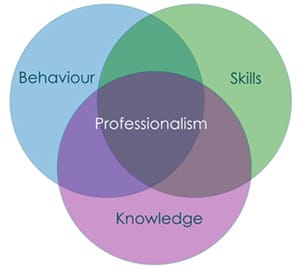What is professionalism
Professionalism is defined as the conduct, qualities, and characteristics that mark an individual as a professional. It signals to people around you that you possess the competence or level of skill that one would expect from a professional. Anything less of this level we consider as amateur.
In business, professionalism is very important because it gives our colleagues and clients the confidence that we are capable of doing our jobs. Acting in professional ways puts our managers and clients at ease. This is because we are showing up for work in the ways they expect. All of this can be very important when going up for your next promotion.
Being unprofessional can set us back in our careers. When we are unprofessional, we are showing up to work in ways that our colleagues and clients are not expecting. This can lead to clients experiencing disappointment. They may even be uncomfortable with our appearances or behaviors. We often hear of “fit” for job interviews and or supplier-vendor relationships. If you are exhibiting things that make your prospective manager or client uncomfortable, you are less likely to be the right “fit.” This may cost you job opportunities and important client relationships.
Characteristics that are considered professional
Some characteristics of a professional include:
Reliability – one hallmark of being a professional is being someone that your peers can count on. It gives your managers the confidence to put your forward for special assignments. It gives your coworkers piece of mind that you will pull your weight in a project. In both cases, you are being someone people can depend on, which is important in a business world built on exchanging promises.
Honesty and integrity – trust is a huge piece of any relationship, even those at work. Being honest and acting with integrity allows your leaders, colleagues, and clients to understand what your intentions are. This helps with managing expectations as your clients will know that you are acting in their best interests. Managers will see you are upholding company values.
Competency – being able to perform your job correctly is equally as important as honesty and reliability. Clients hire professional expecting that they can perform their job accordingly and with a level of precision. This drives a client’s willingness to pay for a professional. What good is paying an individual to do something that they cannot do – the client may be better off Googling a solution on their own.
How has professionalism changed over the years
Workplace cultures have evolved over the years. Changing attitudes of society and the fight for equality evolves our understanding of what is professional behaviour. Additionally, the push to bring one’s authentic self to work paves the road for individuals to bring the version of themselves to work that they are most comfortable with, which may not always be the most professional.
For example, it used to be acceptable to smoke in your office. Nowadays, in North America, if one smokes in their office it is considered unprofessional (and against the law). It is seen as inconsiderate to those who do not smoke and those who suffer from respiratory illnesses.
Another example of changing attitudes towards professionalism is tolerance around hair colour and tattoos. Once seen as a taboo, some professions are becoming more tolerant of individuals who choose to dye their hair red or have ink on their arms. In place of superficial signals of professionalism, workplaces are digging deeper and leaning more on demonstrated competence rather than physical attributes as signs of professionalism.
Furthermore, the rise of technology companies and their pragmatic take on work culture ushered in a new professional standard that is more relaxed. They counter traditional business norms by stressing competence over other signs of professionalism. However, there are many industries that are still stuck in their old way of doing things. And with that, individuals breaking in will need to understand what it means to exude professionalism in those fields.
Areas of professionalism
In addition to embodying the right characteristics, there are actions you can take to look professional. These are in your appearance, your communication, and your external reputation.
Professional appearance
There is a saying about dressing for the role you want, not the role you’re in. Appearances play a big part in first impressions. Showing up well dressed and tidy can make a big difference in how others receive you. It signals to people that you care about being neat and tidy.
Understand the dress code – different industries have different dress codes. For example, in traditional banking, a navy-blue suit with a white shirt is still standard. Whereas in management consulting, companies have relaxed the dress code to business casual. Take note of what is acceptable at work by referring to your employee handbook and looking to your leaders as examples. Stick within that range. When in doubt, be conservative and dress more professional than casually – people rarely frown on someone who shows up in a tailored suit. They do, however, frown on those who wear a t-shirt where it is not appropriate.
Practice good hygiene – simple things like bad breath can really turn those around you off. Keeping yourself well kept makes a difference; not only will you feel great but those around you will take notice.
Professional communication
How you communicate with your colleagues and clients is equally important in demonstrating your professionalism. What you say and how you say it can be key signals of competence. Taking the appropriate level of formality and communication channel tells people how serious you are about the message.
Furthermore, the way you communicate with your colleagues can tell them the status of your relationship with them. Communicate a little more casually and they may feel as though you trust them and are on a cordial level. Take a more formal approach, and your colleagues will know that your relationship is strictly business.
Digital communication forms have changed how we communicate with our colleagues and clients. Where text messages were once seen as informal and even inappropriate, clients are now texting their vendors and partners. Look to your leaders to see what the appropriate channels of communication are.
Managing your reputation
The internet does not forget or forgive. And over the past few years, we’ve learned that employers take your external reputation as seriously as your internal. Remember that how you represent yourself inside and outside of work matters to being a professional. Act inappropriately and or grossly out of line with what is acceptable, and you may find yourself without a job. Despite employers being unable to terminate an employee “for cause” for off-duty behavior, employers still retain the right to terminate without cause as the reaction.
Tips for being professional with customers
Here are a few tips for being professional with your customers:
Be on time – which means being 15 minutes early. Punctuality is still a key indicator as to whether someone is reliable or not. With that in mind, it is important to show up early when meeting with clients. This gives you buffer in case you get lost looking for the client site or experience other issues. Additionally, arriving early means an opportunity to make small talk, which is a great tool for building strong relationships.
Respond promptly – another hallmark of reliability is responding to customers promptly. Customers have options and replying in an expeditious fashion can help differentiate you as a company. It also speaks to the characteristics of professionalism, such as reliability.
Be tolerant to alternative views and beliefs – it can be easy to dismiss someone who does not share the same views as you as someone lesser. However, this approach can make people think that you are not open-minded. Recognize what values are and are not important to you and be tolerant of those who hold different views.
Key takeaways
- Acting professionally is important in giving confidence to your coworkers and colleagues that you are competent and capable of doing your work in a reliable manner.
- Being professional means exhibiting the right kinds of behaviors in your appearance, communication, and outside of your work.
- When in doubt, dress more formally rather than less.
Related Readings
Professional Leadership Institute (PLI) is an educational website providing professionals from all types of businesses with practical education in entrepreneurial leadership. To keep evolving your leadership toolkit, additional PLI resources below will be useful:

